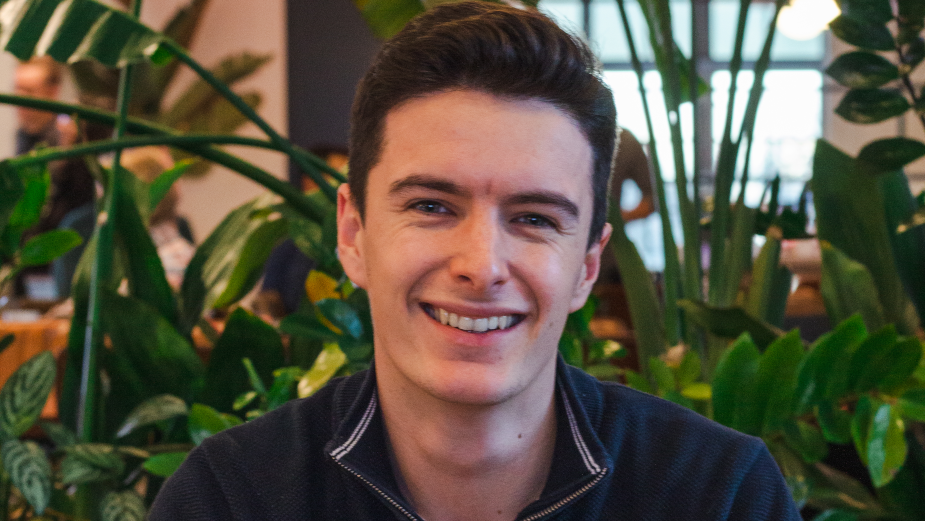
Catalyst Uprising: The Importance of Telling Stories with Luke Taylor

In April 2021, Wunderman Thompson launched the Catalyst Academy to support and develop the next generation of talent. Built to develop future marketers and equip them with the experience and skills to thrive in a competitive industry, the industry-defining programme aims to bring together talent from different backgrounds to build brilliant experiences for consumers.
This spin off of the Uprising series will highlight some of the ambitious, creative, collaborative and curious Catalyst Fellows who have now become full-time employees at Wunderman Thompson after their 18-month rotation through the business, as they share how they’re using their skills to inspire change in their new roles.
This edition is by Luke Taylor, who now works as an account manager at Wunderman Thompson UK, after completing rotations in global client development, data (insights and effectiveness), Prism sports and entertainment and EMEA commercial. Luke explores how his childhood as the son of a national newspaper journalist sparked his love for telling meaningful stories which can create change for the better.
Tell us a little bit of background
Growing up in South-West London, my dad was a national newspaper journalist so I spent so much time hearing tales from around the world – the complicated, messy intersections of so many lives. I’ve always had an inbuilt love of film and writing which only deepened as I studied at the local comprehensive school.
Along with a group of school friends, I formed a small film production group. We lived on a diet of Carpenter, Scorsese and Kubrick, running around the neighbourhood making short films and begging local businesses to take us on and let us film micro-budget commercials to fund our projects. It was at that time that storytelling touched me deeply and I have never really let it go.
Getting started in the industry
I graduated from Durham University in the middle of the global pandemic, which felt challenging at the time. Even sitting with the careers officer in my final year at university, I told them I didn’t know what my future career was but I did know what it looked like. I knew the kind of people I wanted to surround myself with every day. Curious, creative storytellers.
Once again partnering with friends I met at university, we spent a year together travelling the country, producing shorts, documentaries and music videos. We’d gone from point-and-shoots and DSLRs to large-format Arris. It’s time-consuming, inconsistent work but ever since then, I think I’ve always tried to recapture that intense buzz of collaboration we had in those months. It’s part of the reason why I still spend my weekends producing pro-bono for community film projects. In fact, we shot two documentaries last year and I’m currently working with the Royal Association for Deaf People on a short, shooting later in 2023.
During that time, I started to rub shoulders with agency people and I grew increasingly interested in their world. In 2021, I joined Wunderman Thompson on the Catalyst Academy, an eighteen-month rotational fellowship where members move through the agency in four-and-a-half month blocks. It was just enough time to get comfortable, but as soon as you’re comfortable, it’s time to move on.
Spending time in client development, sports marketing, data and analytics and commercial teams, was a powerful way to dispel myths built up about what a modern agency looks like. You quickly learn that constant curiosity - for brands, for people, for technology - is the lifeblood of agency people. You must be comfortable outside your comfort zone and explore things that interest you - even if they don't fit into the prescriptive mould of a ‘personal brand’.
The work
Ad-land often gets accused of existing in a bit of a bubble. So, I think one of the most impactful pieces of work I've had the privilege of being part of was the recently released HSBC Safe Spaces campaign, 'Control', that shed light on the often-overlooked link between cases of domestic abuse and financial abuse. It's a moving, powerful piece of work that we're immensely proud of - and I'm intrigued to see how this campaign develops into actionable impact as we continue to work with the bank.
I feel passionately about creating work that drives positive social benefits. One of the most exciting parts of the job, beyond the pageantry of the above-the-line work that drew me in, is how we as agency partners can work with our clients to unlock the immense social good these businesses can create. There's been a huge push in recent years toward the idea of brand purpose as a competitive advantage - particularly in the way in which brands approach environmental, social and corporate governance (ESG). Now, I think we're starting to see the start of pushback from consumers against this, who have grown tired of the constant barrage of purpose without weight. Marketing is inherently about growth - it's the fundamental purpose - so mixing that with purpose, can become an ugly grey area. Brands need to clearly link their proposition to the claims they make, they need to really think about their own position before speaking - going back to my dad - it's the ‘So what?’ that counts.
The state of the industry
Recessions, geo-political chaos and budget cuts are the bright, pink elephants in most agency offices. And alongside that is an inexorable drive toward speed and efficiency. So, sitting by those pink elephants are the burgeoning generative powerhouses of chat GPT, Midjourney and DALL-E 2.
The AI age of advertising is here to stay, and it's going to be fascinating to see how these platforms, and more specifically the platforms focused on optimisation and planning, will unlock new possibilities for creativity. On the other hand, it's important not to lose sight of the power that lived, human insight can bring. Generative AI, at least as it currently stands, imitates, and fuses by nature. It’s mind-blowing stuff although, maybe it’s just me, but currently I think it can lack the freshness and authenticity of real, human storytelling.
There shouldn't be a distinct mould for what a marketing person looks like - the Catalyst Academy is a testament to that, I think. One thing I'd love to see is more agencies present and recruiting at early career fairs - especially in further education settings. Hiring people from diverse backgrounds allow us to tap more easily into these lived experiences that can build out into better stories, and can go a long way towards making that bubble surrounding the industry a little less opaque.
Passions and inspirations
Film has had a huge influence on me, and it's an important part of my life outside Wunderman Thompson. I direct and produce pro-bono for a couple of community groups, focused on bringing often under-represented groups to screen. As amazing as the client work can be, I think it's important to work on passion projects outside of the usual pressures. It's great to take ownership of something you can really immerse yourself in. On the weekends, you'll find me at the local cinema down the road - it's something I really missed during the pandemic.
I'm a huge football fan - supporting my local League 2 team Sutton United. I've travelled the country with the team and have met a huge variety of amazing people in the eight years of supporting them. We have our own supporters’ teams that play throughout the week, and it's a great way to stay connected to your roots.












